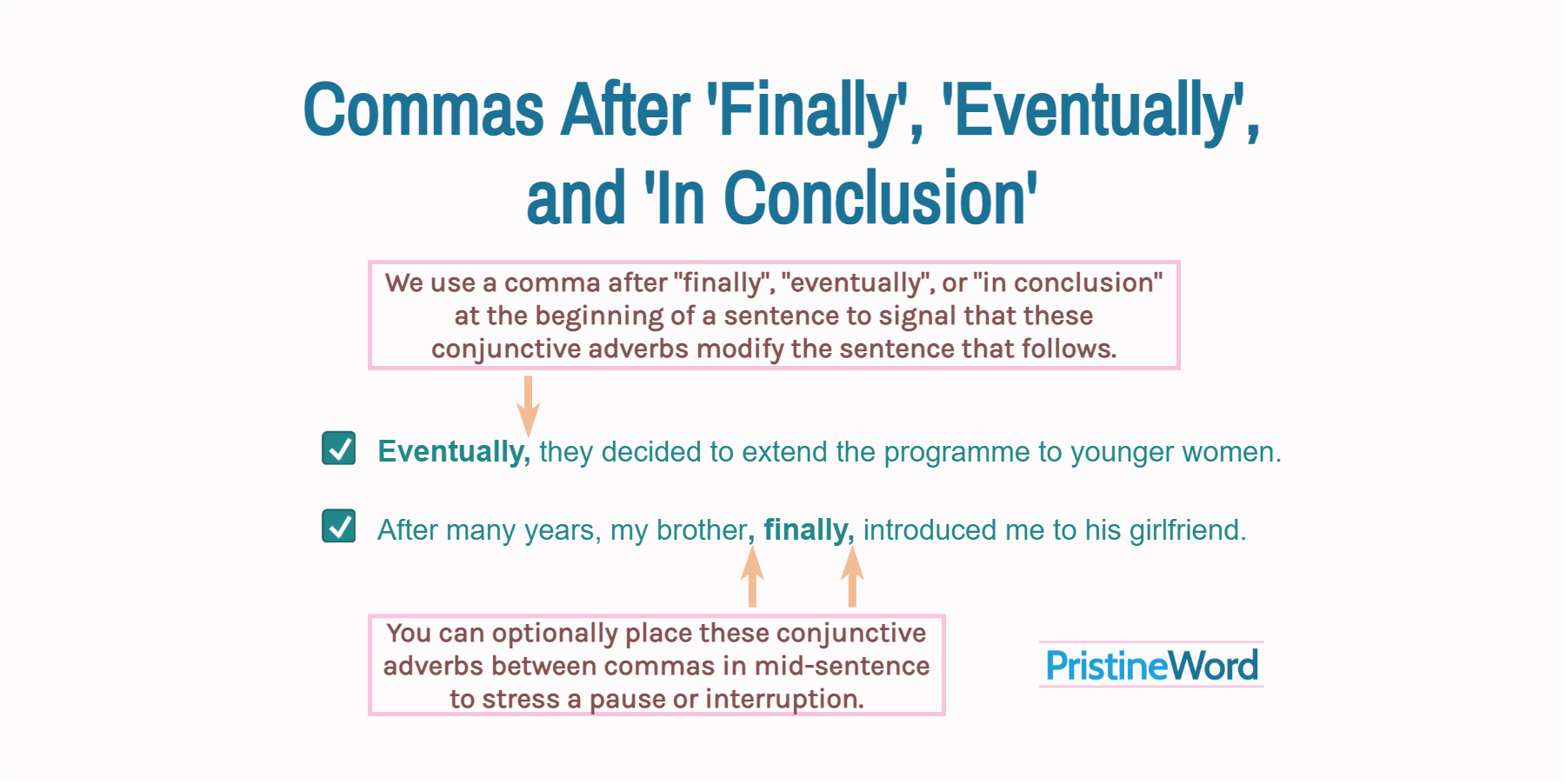We use a comma after "finally", "eventually", or "in conclusion" at the beginning of a sentence to signal that these conjunctive adverbs modify the sentence that follows.
We use a comma after "finally", "eventually", or "in conclusion" at the beginning of a sentence to signal that these conjunctive adverbs modify the sentence that follows.
Eventually, they decided to extend the program to younger women.
In conclusion, including berries in your diet may help fight inflammation as well as be good for your skin.
You can optionally place these words between commas in mid-sentence to stress a pause or interruption.
After many years, my brother, finally, introduced me to his girlfriend.
Do not add commas if "finally", "eventually", or "in conclusion" are regular adverbs; that is, if they modify a single word rather than a complete sentence or clause.
The indicator was stable for a prolonged period and eventually changed.
Contents
1. When to Use Commas With 'Finally', 'Eventually', and 'In Conclusion'
1.1 Differences between 'Finally' and 'In conclusion'
We use "finally" or "in conclusion" to signal that what we are about to say is the last thing that we want to say.
Finally, I'd like to express my thanks to the members of the mountain rescue team.
"In conclusion" is frequently used at the end to sum up or conclude a speech or piece of writing.
In conclusion, sugar-sweetened beverages have a negative impact on children's health.
Recommended: Using commas with adverbs of time
1.2 Differences between 'Finally' and 'Eventually'
The words "finally" or "eventually" are commonly used when something happens after many delays or problems.
- We tend to use "eventually" to emphasize that there were numerous problems (e.g., "Eventually, they found a hardware store on Madison Avenue.")
- We typically use "finally" to emphasize the amount of time it took (e.g., "Finally, they arrived at Queen's hospital.")
We can also use "finally" to indicate that something happens last in a series of events (don't use "eventually" with this meaning.)
We had an onion soup, then a chicken salad, and finally a mango cake.
1.3 Punctuation
We add a comma after "finally", "eventually", or "in conclusion" at the start of a sentence to signal that these adverbs modify not only the word that follows but the complete clause or sentence that follows.
In conclusion, the rapid climate change we are now seeing is caused by deforestation, increasing livestock farming, and fossil fuels.
Eventually, you are going to improve your Spanish skills, so don't worry.
Finally, we went to the grocery store and bought some food for dinner.
We commonly use these expressions at the start of a sentence to introduce a final point or idea. Consequently, they must be preceded by a semicolon or a period.
They didn't know which car to buy; eventually, they chose an electric vehicle because of its lower maintenance costs.
It was really hard to find the location of the meeting. Finally, we got there.
Optionally, set off these conjunctive adverbs between commas to signal a strong interruption in mid-sentence.
They didn't know the location, but, eventually, they got there.
Recommended: When to use a comma with "in the end", "at the end of...", or "at last"
2. When Not to Use Commas
Instead of modifying a sentence or a phrase, you can use "finally" or "eventually" to modify a single word (adjective, verb, or adverb). In this situation, we do not generally use a comma after it.
The sky turned orange, then yellow, and finally black.
Her personality traits were fairly stable for twenty years and eventually changed.
In the middle of a sentence, avoid using commas before and after "finally" or "eventually" if the interruption of the sentence flow is slight.
Mix sugar and milk, add two egg yolks, stir, and finally cook over medium heat.

